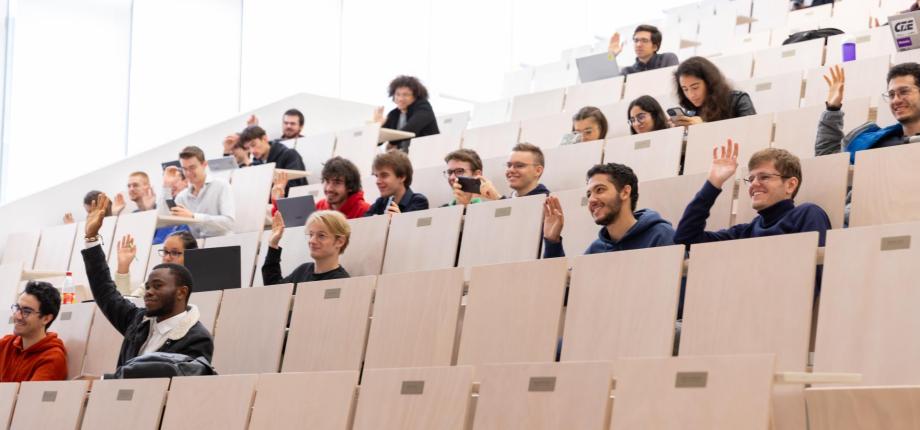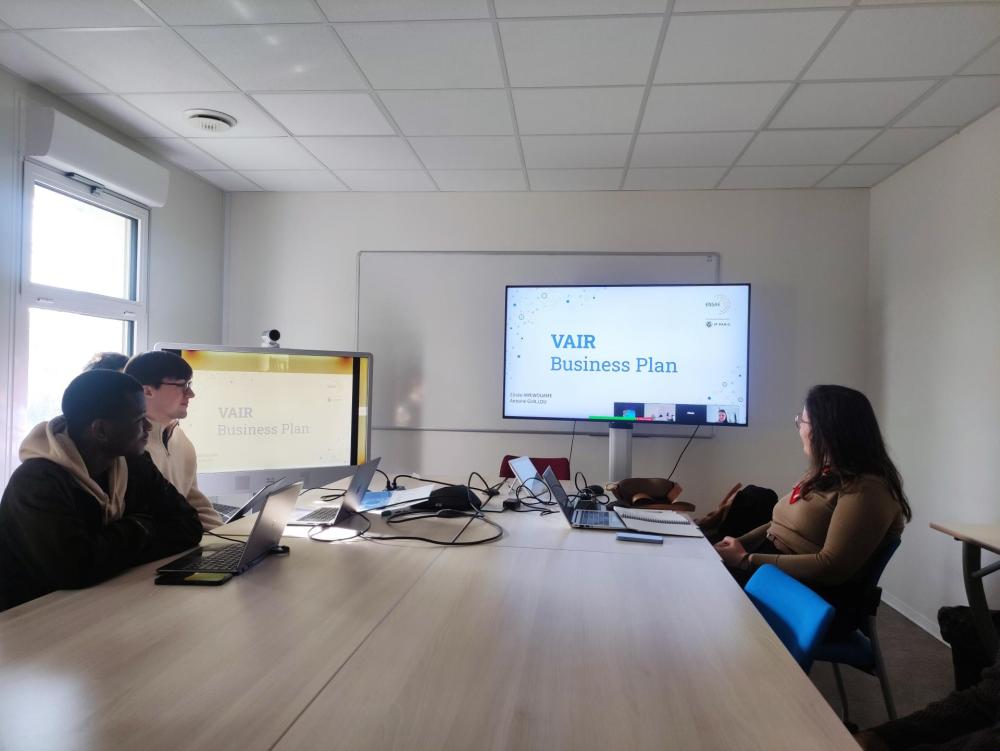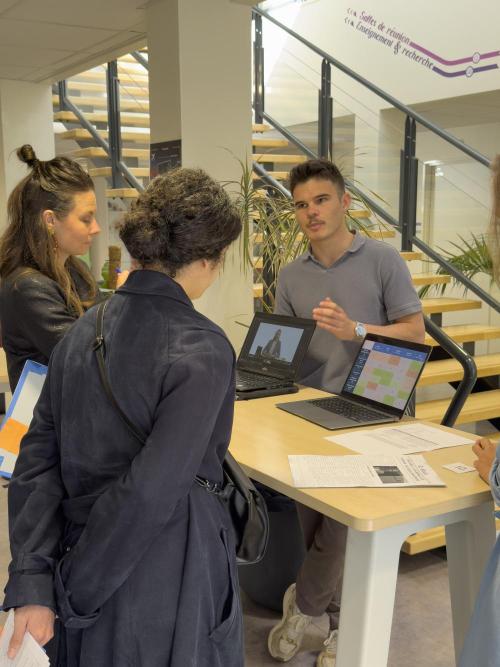Innovation and Entrepreneurship at the Core of IP Paris Programs

Driven by the IP³ university innovation cluster (PUI IP³), and with the support of its founding partners – Inria, SATT Paris-Saclay, and Institut Polytechnique de Paris – nearly 625 participants have been trained in innovation methods, intellectual property, technology transfer, and the opportunities available in the Paris-Saclay ecosystem.
In total, over 100 hours of training, delivered in various formats ranging from immersive weeks to practical workshops, have fostered students’ entrepreneurial mindset.
Here is a look back at five highlights that shaped the 2024–2025 academic year.
1.An immersive Mid-semester Week at Télécom Paris
From February 3 to 7, 2025, Télécom Paris organized for the first time a mid-semester week dedicated to innovation and entrepreneurship. Twenty-three first-year students took part in an intensive program combining creative workshops, site visits (Inria Saclay, the shared SATT technology showroom, Station F, TotalEnergies, Siemens), meetings with key stakeholders, and time-constrained startup creation exercises.
The experience was widely acclaimed: “100% of participants reported being satisfied, with 91% very satisfied—a rare unanimity,” emphasizes Thomas Houy, Associate Professor at Télécom Paris.
Students appreciated “stepping outside the academic framework to explore a new, concrete, and stimulating environment” and discovering “close and accessible support from the very first steps of creating and launching a project.” The experience also encouraged these engineering students to take a critical look at the ecosystem, observing that “some startups are sometimes more innovative than large companies” and pointing out “the many challenges linked to knowledge transfer between research and entrepreneurship,” highlighting “the relevance of collaborations with SATT Paris-Saclay and Inria.”

2. ENSAE Paris: A Hands-On Approach to Entrepreneurship
At ENSAE Paris, the introduction to entrepreneurship took the form of courses for first-year students and immersive workshops for second-year students. The program was designed and run by SATT Paris-Saclay, the IP Paris Innovation Lab, and the X-Up incubator of École Polytechnique.
First-year students were introduced to the fundamentals of design thinking and business creation. Second-year students worked in teams on real projects from incubated startups such as VAir, Schemex, InnPulse, and Jane, most of which took part in Spring and VivaTech this year.
The focus was placed on competitive analysis, business plan development, and expert feedback, with valuable input from Stefka Le Fur, Project Manager at SATT Paris-Saclay, who pointed out: “Supporting students in this exercise, as close as possible to the realities of a startup, gives them a glimpse of what the entrepreneurial journey truly entails: a combination of creativity, rigor, and perseverance.”
Students shared the same sentiment: “It’s concrete—we understand what it really means to carry a project,” summarized one participant. Another added: “Working with real startups confronts us with real constraints.”
This approach helped demystify entrepreneurship and spark new ambitions: some students are now considering joining executive teams in the future, while others aim to capitalize on their research work.
3. Télécom SudParis: A Structured and Evolving Entrepreneurial Program
At Télécom SudParis, entrepreneurship is an integral part of the curriculum, with strong support provided by the school's incubator: IMT Starter.
Highlights of the year included a Deeptech roundtable on January 30 with alumni, led by Benjamin Marteau (Startup Manager at Inria), and on March 13, an immersion in the Paris-Saclay ecosystem, giving students from Évry and Palaiseau the opportunity to discover the resources available to them.
Looking ahead, the school is considering “new formats – possibly compulsory ones – such as elective entrepreneurial modules or integrating entrepreneurial immersions into continuing education, to meet the diverse expectations of students and PhD candidates,” explains Pauline Portier, Development Project Manager at Télécom SudParis.
4. A Design Fiction Seminar at École Polytechnique
On April 18 and May 16, École Polytechnique hosted a design fiction seminar for PIC (Innovation Project Design) master’s students. The theme:
We are in 2040. Organizations have integrated ultra-advanced AIs that generate, test, and optimize ideas instantly. […] Imagine the professional day-to-day of those working in innovation.
Guided by Valentine Perrin and Paul Vachon (designer at the IP Paris Innovation Lab), the workshop encouraged students to reflect on the future of innovation professions, blending science, design, entrepreneurship, and critical thinking.
“Students approached the exercise boldly, creating narratives and solutions from speculative futures but grounded in very real industrial challenges,” noted Paul. Valentine added: “Through these scenarios, they revealed tensions, raised dilemmas, and opened discussions. Design fiction doesn’t provide ready-made answers, but sparks debate on the possible directions our societies may take.”

5. Innovation Days at ENSTA
In June, ENSTA launched an original format for all first-year students, featuring masterclasses, roundtables, and testimonials from student entrepreneurs.
This initiative, in line with the requirements of the Commission des Titres d’Ingénieur (CTI), highlighted the links between entrepreneurship, public research valorization, and industrial R&D. It drew on contributions from the three founding members of the IP³ University Innovation Hub.
“This format was highly appreciated, particularly the exchanges with alumni who had founded startups,” said Didier Lebert, program coordinator. Convinced of its potential to “inspire new vocations” and give rise to new projects, the school plans to repeat the event in 2026.
A Collective Dynamic Serving Innovation
These initiatives reflect the commitment of IP Paris schools and their partners to entrepreneurial support, particularly in the field of deeptech. Aligned with the objectives of the IP³ University Innovation Hub, they contribute to the emergence of a new generation of entrepreneurial engineers and researchers, capable of identifying opportunities, mobilizing resources, and connecting research, innovation, and society.
The enthusiastic reception from students and the diversity of experimental formats encourage the continuation and expansion of these initiatives in 2025–2026.













